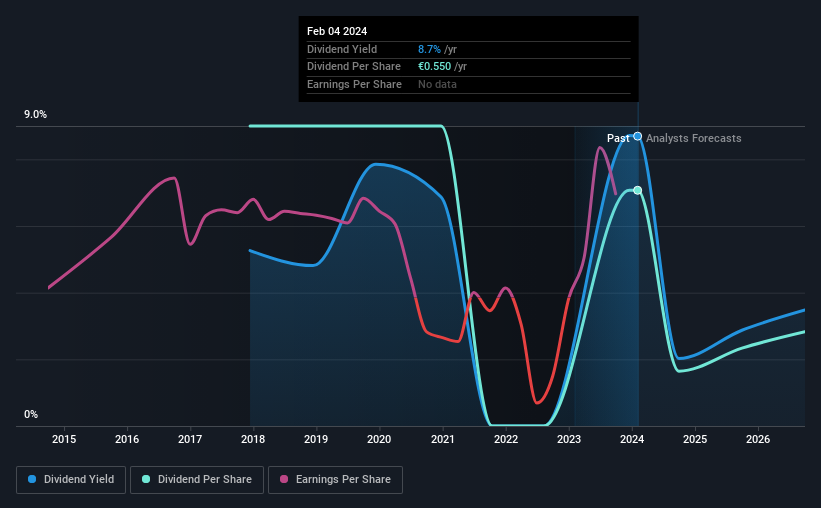- Germany
- /
- Food and Staples Retail
- /
- XTRA:B4B
Here's What We Like About Metro's (ETR:B4B) Upcoming Dividend

Readers hoping to buy Metro AG (ETR:B4B) for its dividend will need to make their move shortly, as the stock is about to trade ex-dividend. The ex-dividend date is one business day before the record date, which is the cut-off date for shareholders to be present on the company's books to be eligible for a dividend payment. The ex-dividend date is an important date to be aware of as any purchase of the stock made on or after this date might mean a late settlement that doesn't show on the record date. Meaning, you will need to purchase Metro's shares before the 8th of February to receive the dividend, which will be paid on the 12th of February.
The company's next dividend payment will be €0.55 per share. Last year, in total, the company distributed €0.55 to shareholders. Calculating the last year's worth of payments shows that Metro has a trailing yield of 8.7% on the current share price of €6.325. Dividends are an important source of income to many shareholders, but the health of the business is crucial to maintaining those dividends. So we need to investigate whether Metro can afford its dividend, and if the dividend could grow.
View our latest analysis for Metro
If a company pays out more in dividends than it earned, then the dividend might become unsustainable - hardly an ideal situation. That's why it's good to see Metro paying out a modest 45% of its earnings.
Click here to see the company's payout ratio, plus analyst estimates of its future dividends.

Have Earnings And Dividends Been Growing?
Stocks in companies that generate sustainable earnings growth often make the best dividend prospects, as it is easier to lift the dividend when earnings are rising. If business enters a downturn and the dividend is cut, the company could see its value fall precipitously. This is why it's a relief to see Metro earnings per share are up 4.3% per annum over the last five years. Recent earnings growth has been limited. Yet there are several ways to grow the dividend, and one of them is simply that the company may choose to pay out more of its earnings as dividends.
The main way most investors will assess a company's dividend prospects is by checking the historical rate of dividend growth. Metro has seen its dividend decline 3.9% per annum on average over the past six years, which is not great to see. Metro is a rare case where dividends have been decreasing at the same time as earnings per share have been improving. It's unusual to see, and could point to unstable conditions in the core business, or more rarely an intensified focus on reinvesting profits.
Final Takeaway
Is Metro an attractive dividend stock, or better left on the shelf? It has been growing its earnings per share somewhat in recent years, although it reinvests more than half its earnings in the business, which could suggest there are some growth projects that have not yet reached fruition. Metro ticks a lot of boxes for us from a dividend perspective, and we think these characteristics should mark the company as deserving of further attention.
In light of that, while Metro has an appealing dividend, it's worth knowing the risks involved with this stock. We've identified 3 warning signs with Metro (at least 1 which shouldn't be ignored), and understanding these should be part of your investment process.
A common investing mistake is buying the first interesting stock you see. Here you can find a full list of high-yield dividend stocks.
New: Manage All Your Stock Portfolios in One Place
We've created the ultimate portfolio companion for stock investors, and it's free.
• Connect an unlimited number of Portfolios and see your total in one currency
• Be alerted to new Warning Signs or Risks via email or mobile
• Track the Fair Value of your stocks
Have feedback on this article? Concerned about the content? Get in touch with us directly. Alternatively, email editorial-team (at) simplywallst.com.
This article by Simply Wall St is general in nature. We provide commentary based on historical data and analyst forecasts only using an unbiased methodology and our articles are not intended to be financial advice. It does not constitute a recommendation to buy or sell any stock, and does not take account of your objectives, or your financial situation. We aim to bring you long-term focused analysis driven by fundamental data. Note that our analysis may not factor in the latest price-sensitive company announcements or qualitative material. Simply Wall St has no position in any stocks mentioned.
About XTRA:B4B
Metro
Operates as a food wholesale company in Germany and internationally.
Adequate balance sheet and fair value.


